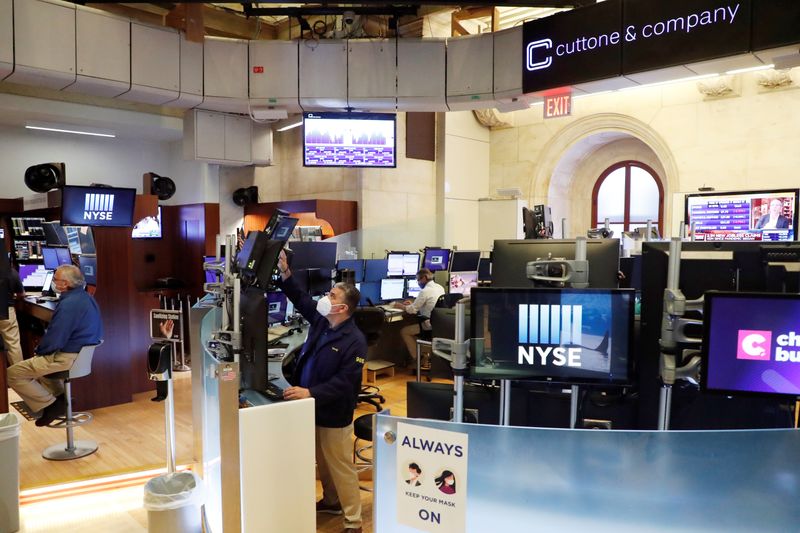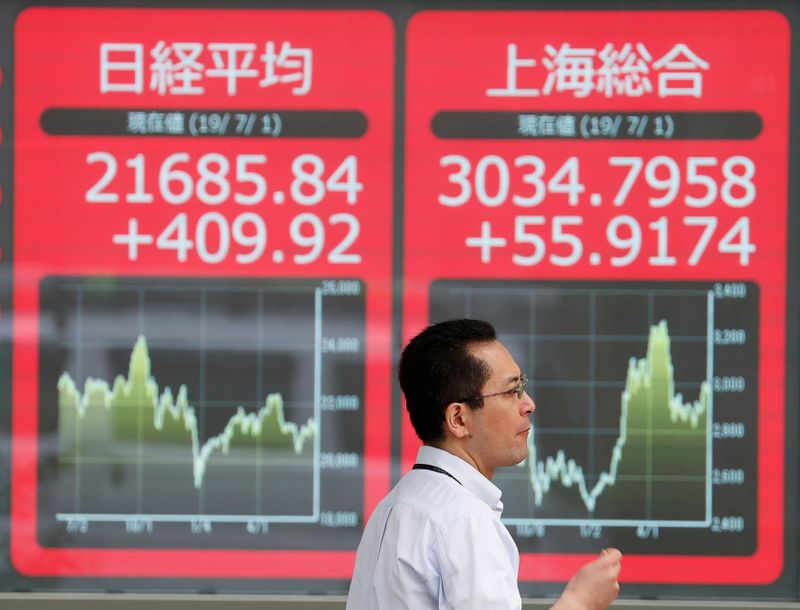By Rodrigo Campos
NEW YORK (Reuters) - Stocks dipped on Friday as data out of China, the euro zone and the United States put a lid on expectations for a sustained global rebound, with traders already worried about a delay in U.S. fiscal stimulus.
European shares were weighed further by a hit to travel stocks after Britain added more European countries, including France, to its quarantine list amid the coronavirus pandemic.
The pan-European STOXX 600 (STOXX) was down 1.20%, although still on track to gain for a second straight week.
On Wall Street, a slowdown in retail sales growth last month and concern over further reluctance by consumers weighed on stocks, with the main indexes down, though not far from record highs.
"The economy remains on life support and Congress going on recess is bad news for large parts of the economy," Edward Moya, New York-based senior market analyst at OANDA, wrote in an afternoon note. "Stocks will not selloff due to the extraordinary policy support that central banks and governments have put in place."
The Dow Jones Industrial Average (DJI) fell 53.66 points, or 0.19%, to 27,843.06, the S&P 500 (SPX) lost 9.69 points, or 0.29%, to 3,363.74 and the Nasdaq Composite (IXIC) dropped 58.59 points, or 0.53%, to 10,983.92.
MSCI's world index (MIWD00000PUS) shed 0.43%, drifting further from all-time highs touched in February. The index has still rallied close to 50% from March's trough despite the pandemic.
The euro zone reported the biggest drop it ever recorded in employment in the second quarter. Data also confirmed a record fall in gross domestic product last quarter and a widening in the euro zone's trade surplus with the rest of the world.
Data showing a slower-than-expected rise in Chinese industrial production and a surprise fall in retail sales put Asian shares on the defensive.
MSCI's broadest index of Asia-Pacific shares outside Japan (MIAPJ0000PUS) fell 0.2%, although shares in Japan (N225) rose 0.2% and Chinese shares (CSI300) rose 1.5% in choppy trade.
Yields on U.S. Treasuries dipped but remained elevated after an auction of 30-year bonds on Thursday met weak demand.
Benchmark 10-year notes (US10YT=RR) last rose 2/32 in price to yield 0.711%, from 0.716% late on Thursday.
A review of the U.S.-China trade deal initially slated for Saturday will be delayed due to scheduling issues and no new date has been agreed upon, according to sources familiar with the plans.
Gold ticked lower and was on track for its steepest weekly fall since March, following a string of nine weeks of gains.
Spot gold
The dollar index was headed for an eighth consecutive week of losses, its longest weekly losing streak in a decade. The index (=USD) fell 0.153%, with the euro (EUR=) up 0.19% to $1.1835.
The Japanese yen strengthened 0.34% versus the greenback at 106.56 per dollar, while Sterling
Oil edged further below $45 a barrel, giving up some of this week's gain, under pressure from doubts about demand recovery due to the COVID-19 pandemic and rising supply.

U.S. crude (CLc1) recently fell 0.28% to $42.12 per barrel and Brent (LCOc1) was at $44.86, down 0.22% on the day.
